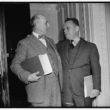Going rogue, five Republican-appointed U.S. Supreme Court justices shredded a century of campaign-law precedent on January 21. The justices decided to unleash unlimited corporate political expenditures for the Grand Old Party, which had lost its grip on Congress, the White House, and federal judicial appointments. The court’s majority in Citizens United v. Federal Election Commissioninvited corporations and unions to spend unlimited amounts of money to elect and defeat candidates of their choosing. Only in their fantasies can unions give the corporate suits a run for their money.
Campaign finance law, in fact, was initially a response to corporate domination of elections in the early days of the robber barons. In 1896, Republican presidential candidate William McKinley used unprecedented amounts of corporate cash to defeat populist Democrat William Jennings Bryan. Eleven years later, President Teddy Roosevelt used his bully pulpit to help end the corporate hijacking of elections, supporting the landmark 1907 ban on corporate funding of federal elections—part of a body of law and legal precedents that the court swept away last month.
The ruling has alarming implications for how the United States addresses—or dodges—issues such as bank regulation, climate change, and health insurance. Every time members of Congress cast a vote, said Fred Wertheimer, president of the nonpartisan reform group Democracy 21, “they potentially face multimillion-dollar campaigns against them.”
And the Republican justices bestowed this gift on their party three months before the advent of the 2010 Census, ensuring that corporate money will influence the fiercely partisan redistricting battles that will follow the census. The greatest abuses of corporate-funded attack ads are likely to occur in the most hotly contested of the newly formed Congressional and legislative districts.
RULING-CLASS RULING—The 5-4 conservative majority ruled that corporations have the same First Amendment rights as actual people, and that laws restricting corporate political spending are “censorship.” This radical decision nullifies the 1907 Tillman Act, which banned corporate political spending, and topples like dominoes a raft of subsequent federal statutes and legal opinions that had insulated political campaigns from corporate cash. With the stroke of a pen the justices also invalidated all state laws prohibiting corporate expenditures to support or attack candidates for state office.
While the majority stopped short of overturning laws that prohibit corporations and unions from making direct contributions to candidates, they appear to have held back only because the Citizens United case did not raise this issue. (The case involves a conservative group that used some corporate funds to produce and distribute a film attacking presidential candidate Hillary Clinton in 2008.) If the First Amendment guarantees corporate political speech, as the court ruled, corporations soon will demand their right to contribute to candidates. Under Citizens United‘s free-speech rationale, it is unthinkable that this court could or would turn them down.
Justice Anthony Kennedy’s majority opinion expounds on the evils of government censorship and the sanctity of political speech. Yet it glosses over the radical premise that First Amendment guarantees extend to both people and corporations. Skewering this presumption, Justice John Paul Stevens wrote in his dissent: “Under the majority’s view, I suppose it may be a First Amendment problem that corporations are not permitted to vote, given that voting is, among other things, a form of speech.” By sarcastically suggesting such absurd ideas, Justice Stevens runs the risk that his activist brethren will adopt them as law.
For the majority to reach its radical conclusion about corporate free speech was not easy. The Citizens United lawsuit focused on a narrow, technical aspect of campaign finance regulation. The Court’s judicial activists adapted the case to their own end: to overturn long-settled precedents banning corporate political activism. Offering no new circumstances to justify their actions, five justices threw overboard Supreme Court opinions decided as recently as 1990, 2003 and 2007.
“This matches or exceeds Bush v. Gore in ideological or partisan overreaching by the court,” said Michael Waldman, director of New York University’s Brennan Center for Justice. “In that case, the court reached into the political process to hand the election to one candidate. Today it reached into the political process to hand unprecedented power to corporations.”
VISUALIZING CORPORATE DEMOCRACY—To gauge the real-world political impact of banning corporate campaigning, consider that some states prohibit such activity while others do not. Following the Citizens United decision, the Montana-based National Institute on Money in State Politics analyzed state campaign contributions in 2007 and 2008. The institute found that in the 22 states that ban corporate contributions, state candidates raised almost half their funds from human individuals and less than a quarter from special-interest entities (the remainder came from unions, political parties, and unspecified “small donors”). Tellingly, these proportions were reversed in the 28 states that allow candidates to accept corporate funds.
It is quaint to argue that prohibitions on corporate campaigning silence corporate political speech. Even when businesses are banned from raiding their treasuries to shape elections, corporate executives, shareholders and lobbyists spend freely. During the 2008 federal elections, political committees of businesses spent more than four times as much as labor committees, according to the Center for Responsive Politics. And this was under a federal campaign regimen that imposed limits. Big business will butcher “big labor” in Citizens United‘s no-limits political gladiator’s arena.
A brief filed by the White House-appointed U.S. solicitor general warned the justices about what was to come if they unleashed corporate political spending. The solicitor noted that during the 2008 election cycle, federally registered political parties and committees spent $1.5 billion. During the same period Fortune 100 companies had combined profits of $605 billion. If those 100 corporations had devoted just 1 percent of their profits to electoral advocacy, the solicitor warned, they would have more than doubled the federal spending of all political parties and PACs combined.
On the day the court ruled, Patton Boggs, a powerful lobby and law firm, issued a memo that provides a big-business perspective on the case. The lead author of the memo was Benjamin Ginsberg, who resigned from the 2004 Bush-Cheney campaign following reports that he was also advising Swift Boat Veterans for Truth on how to spend millions of dollars trashing John Kerry’s military record. “The decision will drastically alter the landscape for candidates and political parties,” said Ginsberg’s memo. “While the limits and prohibitions on contributions remain in place, much more spending by outside groups throughout the election cycle specifically praising or criticizing candidates should be expected.”
There is a logic to Ginsberg’s analysis. Because candidates and political parties remain subject to contribution limits, they will forfeit considerable control over their own campaigns. While some influence will shift to corporations and unions, Ginsberg and his colleagues predicted that business trade groups and ideological nonprofits (such as the plaintiff in the Citizens United case) are “likely to emerge as the biggest players in the 2010 and 2012 elections.” When corporations or unions finance attack ads directly, they must publicly disclose their contributions. Corporations and unions can dodge disclosure, however, if they fund a trade group or nonprofit to mount their political attacks for them. In Orwellian fashion, an attack ad funded by ExxonMobil, for example, might be disclosed as being paid for by an entity called something like “Americans for Clean Air.”
The decision does not confine political free-speech rights to U.S. corporations. U.S. subsidiaries of foreign corporations also can tap their treasuries—including funds from their foreign headquarters—to influence U.S. elections. The only restriction, according to Craig Holman, a campaign finance expert atPublic Citizen, is that when foreign nationals wire rubles, yuan or pesos to their U.S. subsidiaries, they cannot earmark funds for political activities. Holman half-joked that Al-Qaeda attorneys already are analyzing this loophole.
FIGHTING BACK—Characterizing the decision as “a major victory for big oil, Wall Street banks, health insurance companies and the other powerful interests,” President Obama pledged to work with Congress to “develop a forceful response.” While it’s clear that the Citizens United decision will flood our political system in a torrent of corporate cash, it is less clear what can be done about it now. A constitutional right granted by the nation’s highest court is not easily uprooted. While amending the Constitution would be a solid fix, the requisite Congressional super-majority is nowhere on the horizon. Improving the Supreme Court’s bloodline also takes time and does not guarantee desired results.
Lacking a quick fix, activists are promoting a variety of weaker measures to mitigate the ruling’s impact. The Center for Political Accountability urges corporate boards of directors to insist upon approving all corporate political activities and disclosing such activism to shareholders and the public. Seventy corporations have voluntarily adopted the Center’s transparency guidelines. Congress could add some muscle to that suggestion and require all publicly traded corporations to follow such oversight and disclosure rules.
Others argue that the tsunami of corporate political spending that Citizens United unleashes can be partially offset through more public financing of elections. Various citizen groups are pushing “Clean Election” laws that mandate greater public financing of state elections. The ruling also gives new impetus to the stalled Fair Elections Now Act, which would establish public financing for Congressional elections. And reformers want to reinvigorate the public-financing system for presidential campaigns by rewarding small-denomination contributions with public matching funds. Such measures could help real people cope with the new unlimited political speech rights of corporations.
But these are half measures, which unfortunately are all we have for now.
Craig McDonald and Andrew Wheat direct Texans for Public Justice, an Austin-based non-partisan watchdog organization that tracks corporate influence in Texas politics. TPJ joined with other reform organizations to file an amicus brief in Citizens United v. FEC, urging the court to uphold the ban on corporate political spending.






0 Comments